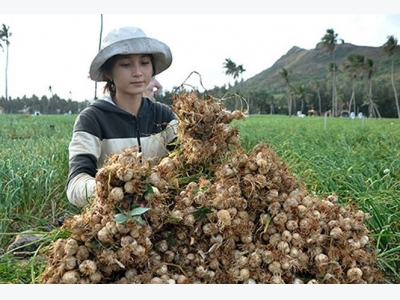Japanese garlic may overtake Ly Son garlic fields on Ly Son island

With the growing of Japanese elephant garlic on Ly Son Island, Ly Son garlic, a well-known brand, will be threatened, scientists say.
Ly Son garlic is well known brand
The Quang Ngai People’s Committee has OK’ed carrying out research to prepare for the cultivation of Japanese garlic on Ly Son Island.
Tadashi Yoshii, CEO of CAN Holdings from Japan, at a working session with Quang Ngai’s deputy chair Dang Van Minh, said the elephant garlic variety brings high yield of 4-5 tons per hectare. Each kilogram of the garlic is sold at VND180,000 in Japan.
Le Tien Dung, a renowned agronomist, said he was surprised when hearing the news that the local authorities allowed an exotic garlic species which could be a rival to native garlic.
Ly Son garlic, especially ‘toi co don’ as called by local people, is a specialty famous in Vietnam and the world which can be grown only on Ly Son with specific natural conditions. Ly Son’s people selected the precious variety after many generations.
Ly Son garlic, especially ‘toi co don’ as called by local people, is a specialty famous in Vietnam and the world which can be grown only on Ly Son with specific natural conditions.
According to Dung, toi co don, which is very valuable, priced at VND2-3 million per kilogram, is one of the best varieties which needs to be protected for development.
“Ly Son garlic will lose its position because it cannot compete with the Japanese garlic which has higher yield,” Dung warned.
“The Japanese garlic could be grown in other localities, except Ly Son. If Ly Son garlic disappears, our next generations will no longer have precious produce,” he said, adding that it is difficult to build up a brand.
The scientist went on to say that Vietnam needs to learn a lesson from the invasion of exotic plant varieties. An Cuu rice variety is an example.
“With the limited land fund in Ly Son, Ly Son garlic should be the only garlic variety to be grown there,” he concluded.
An expert from the Vietnam Agriculture Academy commented that importing foreign varieties is ‘in fashion’ because people think foreign varieties are always better than Vietnamese.
He said that Japanese experts with whom he worked in the past once issued a warning about Vietnam’s massive import of foreign varieties, though Vietnam has very good ones.
In developed countries, gene funds are considered invaluable assets. In Vietnam, provincial leaders pay inappropriate attention to the issue, but only care about short term economic benefits.
Plant varieties can only be brought to Vietnam after they are tested by the Ministry of Agriculture and Rural Development (MARD) and accepted by localities. However, it appears that investors ignored the required steps.
Related news
 Rural, agricultural, fishery census 2016 announced
Rural, agricultural, fishery census 2016 announced The General Statistics Office of Vietnam (GSO) held a press conference in Hanoi on October 9 to announce the Rural, Agricultural and Fishery Census 2016.
 Exporting pepper is hard to return to the 'golden age'?
Exporting pepper is hard to return to the 'golden age'? Being the pepper exporting nation is ranked as the first of the world with increasing export turnover for many years, however, from the second half of 2016 back
 Agricultural growth still facing underlying risks
Agricultural growth still facing underlying risks Vietnam’s agricultural growth was not really as high as expected during the past 9 months of this year with a low added value and potential risks.
 Ben Tre targets sustainable agricultural development
Ben Tre targets sustainable agricultural development The Mekong Delta province of Ben Tre has replaced rice by coconut, fruit trees, vegetables and aquaculture in an area of 7,548 hectares
 Vietnam seeks ways to boost fruit, veggie exports to EU
Vietnam seeks ways to boost fruit, veggie exports to EU Experts and businesses discussed ways to maintain and expand EU markets for Vietnam’s fruit and vegetable exports at a seminar in Ho Chi Minh City